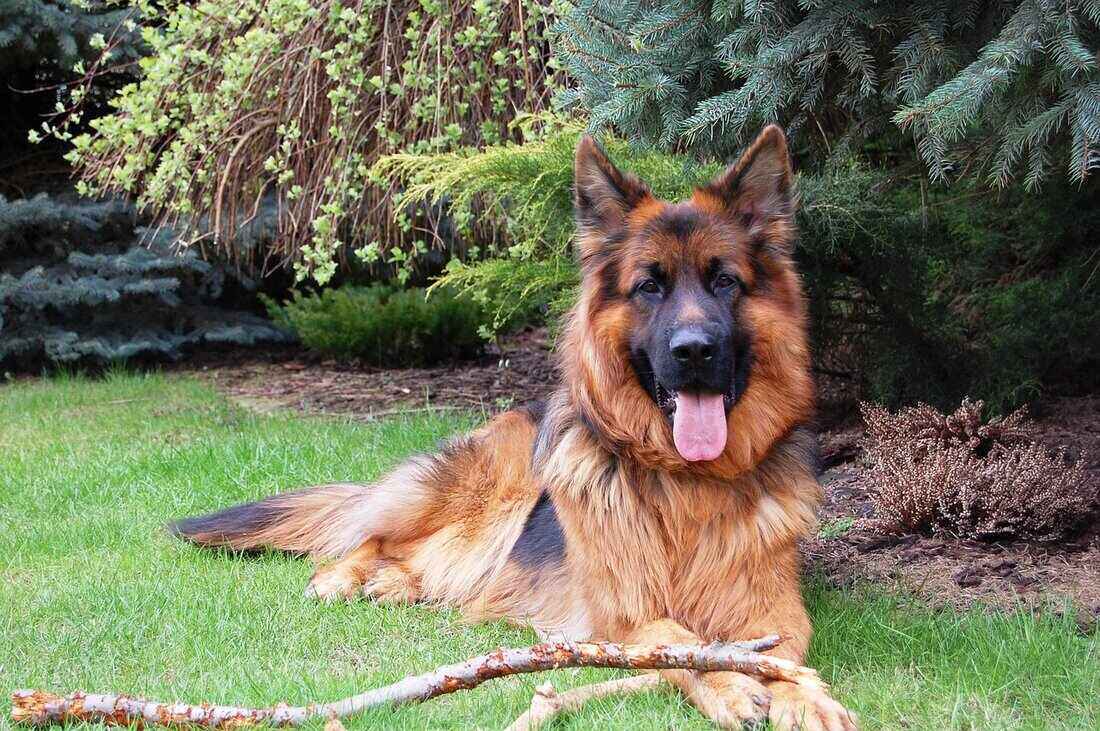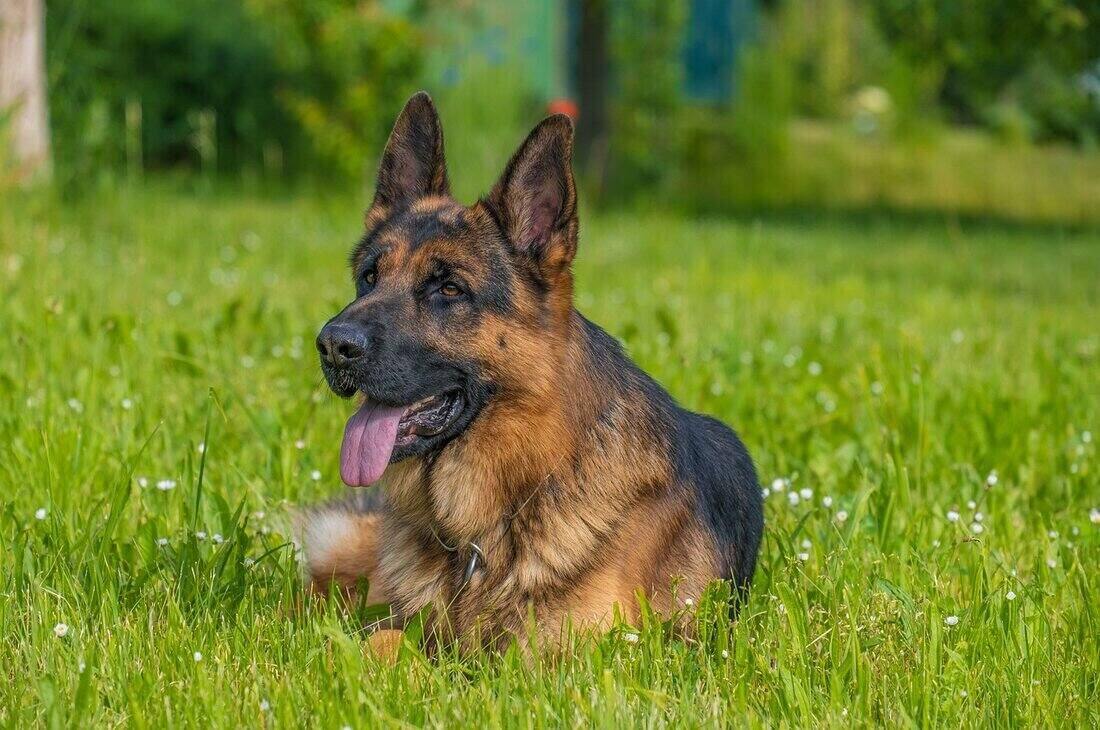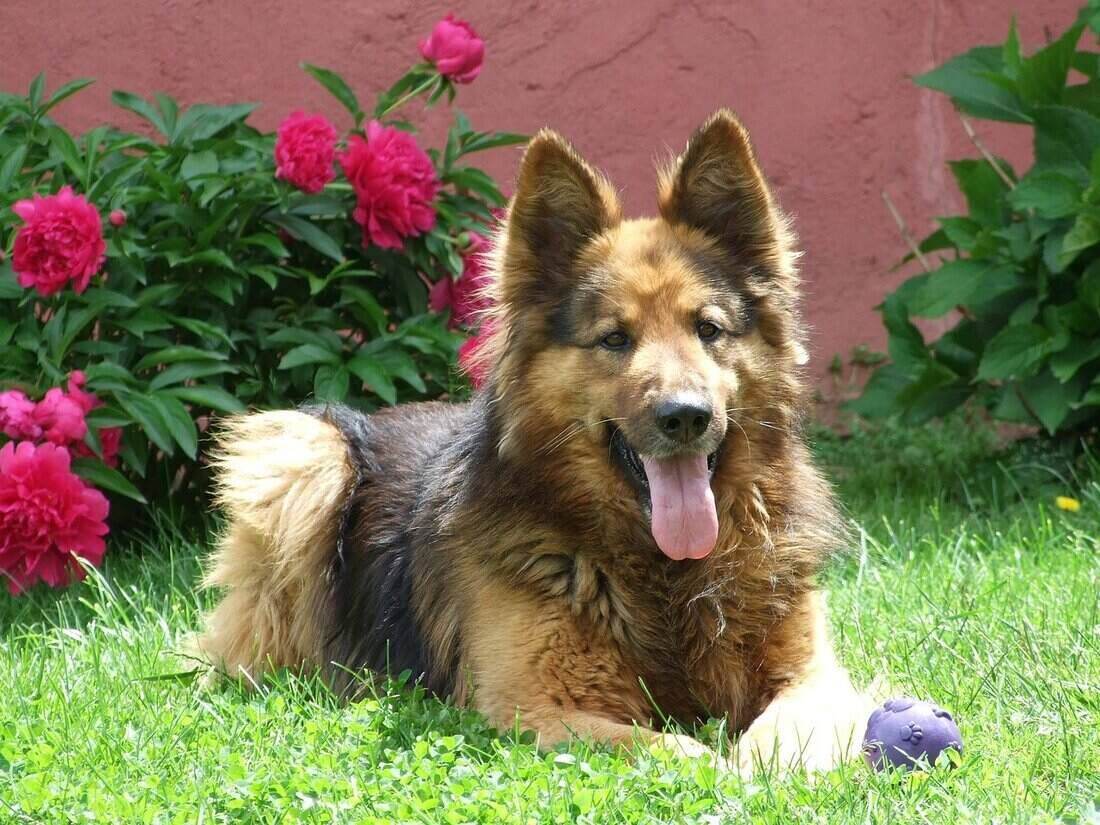Why Do German Shepherds Pant So Much (And What To Do About It)
Have you ever wondered why your spirited German Shepherd seems to be panting more often than not, especially after a playful romp in the yard or during those sultry summer days?
Panting is a common sight among all breeds, but German Shepherds, with their lively demeanor and fluffy coats, might just give you a bit more to ponder over.
What Exactly is Panting?
At its core, panting is a breezy mechanism that dogs use to cool themselves down. Unlike humans, dogs don’t sweat out excess body heat through large areas of their skin.
Instead, they rely on the swift exchange of air through panting to regulate their body temperature. It’s their personal, built-in air conditioner!

Thermoregulation in German Shepherds
Thermoregulation, the process of maintaining just the right body temperature, is vital for all living creatures, and our beloved German Shepherds are no exception.
Ever noticed how your dog starts panting after a few minutes of fetch? That’s thermoregulation in action, right there in your backyard!
Role of Panting in Temperature Control
Panting allows German Shepherds to evaporate moisture from their tongues, inside their mouths, and the upper respiratory tract. As this moisture evaporates, it effectively pulls heat away from their body, helping to cool them down.
Imagine it as a natural, quick-cooling system that activates whenever they get too warm. Isn’t nature fascinating?
Indicators of Overheating
While panting is normal, excessive panting could be a sign of overheating—a situation we want to avoid. Keep an eye out for symptoms such as excessive drooling, reddened gums, or a rapid pulse.
More severe signs might include lethargy, dizziness, or even vomiting. These are all red flags that your furry friend might be saying, “Hey, I’m too hot!”
Immediate Steps to Take if a Dog Shows Signs of Overheating
If you suspect your German Shepherd is overheating, act quickly:
- Move them to a cooler area: indoors or in the shade.
- Provide cool, fresh water to drink, but don’t force it if they’re not interested.
- Use cool water to dampen their body. Focus on wetting the neck, underarms, and feet, or use a wet towel to cover them.
- Allow them to rest since continued exertion can exacerbate the problem.
Physical Activity and Panting
It’s no secret that German Shepherds thrive on physical activity. Their vigor and zest for life translate into a lot of movement, and consequently, a lot of panting. But did you ever wonder exactly why your German Shepherd seems to be huffing even before the fetch game begins?
Activity-Induced Panting
Physical exertion naturally raises body temperature. As your German Shepherd runs, jumps, and plays, their muscles generate heat. To combat this temperature rise, their body responds by increasing the rate of panting.
This rapid breathing is their way of releasing heat and cooling down. Just like you might breathe harder after a sprint, your dog pants more when active.
Anticipation of Activities
Interestingly, the mere anticipation of physical activity can also trigger panting. Have you noticed your German Shepherd panting as you lace up your walking shoes or grab their leash?
This is because they’re not just physically active but also emotionally engaged. The excitement and expectation of what’s coming can accelerate their heart rate and breathing, getting them all worked up before the activity even starts.
It’s like the starting bell of a race for them, revving up their engines in preparation for the fun ahead.
Emotional and Physical Health Factors
While we often see panting as a natural response to physical activity in German Shepherds, it’s important to recognize that their emotional state and overall health also play significant roles.
Understanding these factors can help us ensure our dogs are not only active but also emotionally and physically well-balanced.
Panting Due to Emotional Stress
German Shepherds are highly intelligent and sensitive dogs, making them acutely aware of their surroundings and the emotions of their owners. Stress, anxiety, and excitement can all trigger an increase in panting.
Whether it’s the anticipation of a fun game with kids, the stress of a vet visit, or anxiety from fireworks or storms, emotional responses can cause your Shepherd to pant more heavily. This type of panting is their body’s way of coping with emotional overload, helping to regulate their stress levels.
Pain and Discomfort as Triggers for Panting
Sometimes, panting may be a sign that your German Shepherd is in pain or discomfort. Conditions such as arthritis, injuries, or internal discomfort can lead to increased panting.
It’s a subtle sign that they might not be just tired but could be hurting. Regular check-ups with your vet can help catch these issues early, ensuring your dog doesn’t have to endure prolonged discomfort.

Respiratory Problems
Respiratory issues can also cause excessive panting. Conditions like kennel cough, bronchitis, or even allergies can make breathing more laborious for your dog, leading to increased panting as they attempt to take in more air.
Monitoring your German Shepherd for other symptoms like coughing, wheezing, or a runny nose can help you determine if there’s a deeper respiratory issue at play.
Hydration and Panting
Hydration plays a critical role in the health and well-being of German Shepherds, especially considering how panting is integral to their temperature regulation. Let’s dive into why keeping your dog well-hydrated is essential and how it impacts their panting.
Connection Between Panting and Dehydration
Panting, while effective in cooling down your German Shepherd, also results in a significant loss of moisture through evaporation from the tongue and respiratory tract. This loss can quickly lead to dehydration if not properly managed, especially on hot days or after intense exercise.
Dehydration, in turn, can increase the rate of panting, creating a cycle that can be hard to break if water intake isn’t increased. Recognizing this connection is the first step in ensuring your dog remains healthy and comfortable.
Importance of Ensuring a Constant Supply of Fresh Water
To combat the risks associated with dehydration, it’s vital to ensure that your German Shepherd has constant access to fresh, clean water. Whether you’re at home, on a walk, or traveling, make it a priority to have water available for your dog to drink at their leisure.
This simple step can dramatically reduce the risk of dehydration and help regulate their body temperature more efficiently.
Practical Tips for Hydration
Here are some easy-to-follow tips to keep your German Shepherd well-hydrated:
- Water Bowls: Place multiple water bowls around your home and in any outdoor spaces your dog frequents. This ensures they always have access to water, no matter where they are.
- Portable Water Bottles: For those who enjoy long walks or hikes with their dog, consider carrying a portable water bottle designed for dogs. These are particularly handy and ensure your pup can hydrate, even while on the go.
- Monitor Water Intake: Keep an eye on how much water your dog is drinking. A sudden increase or decrease in water intake can be a sign of health issues.
- Encourage Drinking: Some dogs may need encouragement to drink enough water. You can stimulate their interest in water by adding flavors, such as a splash of broth (ensure it’s onion and garlic-free, as these are toxic to dogs).
Recognizing Signs of Dehydration
Being able to recognize the signs of dehydration can help you take swift action to rectify the situation. Look out for symptoms such as:
- Dry gums
- Excessive panting
- Thick saliva
- Lethargy
If you notice any of these signs, increase your dog’s water intake immediately. If symptoms persist, it might be a good idea to consult your vet for further advice.
By understanding the vital role hydration plays in regulating panting and temperature, you can take proactive steps to ensure your German Shepherd stays healthy, active, and happy.
After all, a well-hydrated dog is a joyous companion, ready to enjoy every adventure with you!
Panting in German Shepherd Puppies
When it comes to German Shepherd puppies, panting can often seem like a part of their charming demeanor. But just like their adult counterparts, puppies pant for several reasons, not just from running around. Understanding why your puppy pants can help you ensure they grow up healthy and happy.
Normal Panting in Puppies
Puppies, particularly active breeds like German Shepherds, often pant more than adult dogs. This is due to their high energy levels and their still-developing thermoregulation systems.
During play, excitement, or even after a bout of mischief, it’s common to see a puppy panting as they try to cool down.

Reasons Why Puppies May Pant More
Aside from cooling themselves, there are other reasons why puppies pant:
- Growth Spurts: Puppies experience rapid growth phases which can cause temporary discomfort and stress, leading to increased panting.
- Teething: Just like human babies, puppies go through teething. This can be uncomfortable for them, and panting helps manage some of that discomfort.
- High Levels of Playfulness: Puppies have bursts of energy and excitement which can cause them to overexert themselves quickly, resulting in heavy panting.
How To Recognize Abnormal Panting
Panting is a typical behavior in German Shepherds, given their active nature and physical requirements. However, as a responsible pet owner, it’s crucial to distinguish between normal panting and signs that could indicate underlying health issues. Recognizing when panting is abnormal can be the key to early detection of potential health problems.
When Panting is a Concern
While panting is a normal response to exercise or heat, there are circumstances when it should raise a red flag:
- Excessive Panting: If your German Shepherd starts panting more heavily than usual without a clear reason, such as after moderate exercise or in cool weather, it could signal a problem.
- Panting at Rest: Panting while resting or sleeping, especially in a cool environment, is unusual and warrants further investigation.
- Change in Panting Sound: If the panting sounds harsher, more labored, or includes wheezing, it could indicate respiratory or cardiovascular issues.
Symptoms That Indicate a Need for Veterinary Attention
Alongside unusual panting patterns, other symptoms may suggest that your German Shepherd needs to see a vet:
- Increased Heart Rate: A rapid heartbeat combined with excessive panting could point to distress or overheating.
- Lethargy or Unwillingness to Move: If your dog seems unusually tired and continues to pant, it could be a sign of a broader issue.
- Loss of Appetite: Often, a change in eating habits paired with abnormal panting can indicate health problems.
- Behavioral Changes: Look for signs of discomfort, such as your dog avoiding being touched, which could suggest pain.
Steps to Take if Abnormal Panting Occurs
If you notice any signs of abnormal panting, consider the following steps:
- Provide a Cool and Quiet Space: Help your dog calm down in a comfortable environment and observe if the panting decreases.
- Ensure Hydration: Offer fresh water to your dog. Dehydration can contribute to excessive panting.
- Document the Symptoms: Take notes or a video of the panting and any other unusual behaviors to show your vet.
- Visit Your Veterinarian: Schedule an appointment with your veterinarian to discuss your observations and get a professional assessment. Early diagnosis and treatment are crucial for managing any potential health issues effectively.
Frequently Asked Questions
Is it normal for German Shepherds to breathe heavily?
Yes, it is relatively normal for German Shepherds to breathe heavily, especially after physical activity or during times of stress or excitement. GSD breed is highly active and has a dense coat, which can contribute to increased panting to regulate their body temperature.
However, if your German Shepherd is breathing heavily without a clear reason, such as during rest or in cool temperatures, it may be a sign to consult your veterinarian.
How do I know if my dog is panting too much?
While panting is a typical behavior for dogs, especially after exercise or in the heat, excessive panting might indicate an issue. Signs that your dog may be panting excessively include panting that sounds louder or harsher, panting at inappropriate times (like late at night or in cool environments), or panting that doesn’t stop even after they’ve cooled down or calmed down.
If your dog shows any of these signs, it’s advisable to seek a professional opinion from your vet.
What dog breeds pant the most?
Breeds that tend to pant more frequently include those with thicker coats or those that are brachycephalic (short-nosed), as both traits can affect their cooling efficiency. Examples include:
- Thick-coated breeds like Huskies, Saint Bernards, and Golden Retrievers, especially in warmer climates.
- Brachycephalic breeds such as Bulldogs, Pugs, and Boxers, which may have more difficulty breathing due to their shortened airways.
Conclusion
As we wrap up, remember that while panting is a normal behavior in German Shepherds, excessive or unusual panting can be a sign of deeper issues.
Regularly observing and understanding your dog’s panting patterns are key to ensuring their well-being. It’s not just about keeping them cool and comfortable; it’s about maintaining their overall health and ensuring they lead a happy and active life.
Encourage and nurture this beautiful relationship by staying informed, attentive, and responsive to your dog’s needs. Here’s to many happy, healthy years with your loyal German Shepherd, filled with less worry about panting and more enjoyment of each other’s company.
